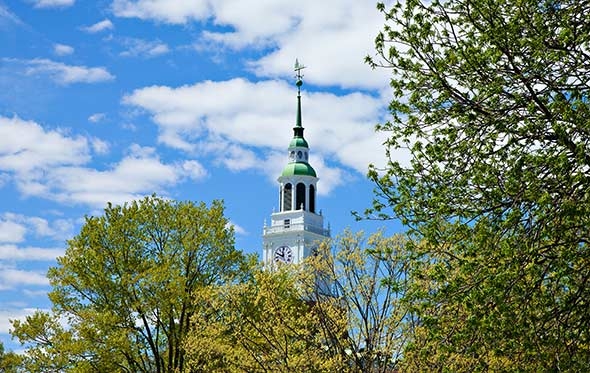Dartmouth’s president tonight called for an end to high-risk and harmful behavior on campus that is hurting students, dividing the community, distracting the College from its core mission, and compromising its vision for the future.
President Phil Hanlon ’77, echoing what Board of Trustees Chair Steve Mandel ’78 wrote to the community in March, said “enough is enough,” and asked the community to come together to move Dartmouth forward.

At a rare presidential summit with dozens of student leaders, as well as faculty, staff, and alumni, President Hanlon laid out a process of reform, critical to the success of his wide-reaching initiative known as Moving Dartmouth Forward. The effort will promote change in every place on campus where social activities take place, including residence halls, greek and affinity houses, and senior societies.
Efforts to date have included important steps such as: a new sexual assault policy to be enforced in June that includes mandatory expulsion and an external investigatory process; a new center focused on violence prevention and community mobilization; training for students to recognize and prevent potential sexual assaults; and high-risk, binge drinking initiatives that have demonstrated progress over the past three years.
Read more:
He announced the formation of a Presidential Steering Committee to focus on three critical areas: sexual assault, high-risk drinking, and lack of inclusion. The Steering Committee will comprise representation of students, faculty, administrators, and alumni. The members of the Steering Committee will be named in the coming days.
“This is not a mandate from the top. To be successful, every member of the community—especially students—must be part of the solution,” emphasized Hanlon.
Hanlon outlined a set of actions, and charged the Steering Committee to work together from now through November to crowd-source the community’s ideas and vet the best solutions to move Dartmouth forward. The Steering Committee will submit its recommendations to the president and his senior team in time for Board of Trustees approval this fall.
“This is a chance to combine collective wisdom, creativity, and shared commitment to envision this College at its very best. This is a time to engage the community and build momentum. Working together, and with the courage of our convictions, Dartmouth will move forward,” said Dean of the College Charlotte Johnson.
Hanlon stressed that solving this set of challenges is integral to helping Dartmouth realize its full potential, painting a vision of “a campus where students are formed into leaders through rigorous academic training and shared efforts to make a difference in the world, where Dartmouth’s footprint has never been greater.”
“There are some in higher education who say that this set of problems cannot be solved,” he said. “But I say Dartmouth will prove them wrong. High-risk and harmful behavior will not be tolerated. We will move Dartmouth forward.”


